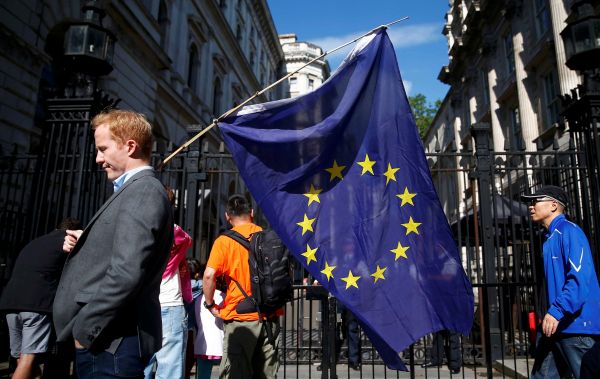Despite Brexit, ‘golden era’ of China-UK ties will continue

A British man carrying an EU flag walks in the vicinity of Downing Street on June 24. Britain's historic vote to leave the European Union that day has set off a chain reaction of serious consequences, but the solid foundation of China-UK cooperation ensures that bilateral ties will hardly be affected.
Britain’s momentous vote to leave the European Union on June 24 has sparked anxiety about the implications of Brexit for China-UK relations.
After the results of the referendum were announced, the pound suffered the worst decline in history and global stock markets plummeted. Nonetheless, the solid foundation of China-UK cooperation will prevent the vote from derailing the “golden era” of bilateral relations proclaimed by the two countries’ heads of state during Chinese President Xi Jinping’s visit to the United Kingdom last year.
The future of economic cooperation is the first concern. Among the EU countries, Britain was the first to petition the European Union to grant market economy status to China by the end of the year. It also favored the bilateral investment agreement between the European Union and China. After leaving the 28-member bloc, Britain’s role on the international stage will change, bringing greater uncertainty to bilateral ties.
Some analysts do not expect Brexit to negatively affect China-UK relations, but there are doomsayers, too. The resignation of British Prime Minister David Cameron will reshape the United Kingdom’s political landscape, leading some to be pessimistic about the prospects of China-UK cooperation.
Considering the complicated situation, we should pay attention to positive factors, especially the strong base of bilateral interaction that has been built in recent years.
First, the China-UK partnership is solidly based on mutual benefit. China cooperates with Britain not for its own interests nor has it attempted to take advantage of Britain to exert influence over the European Union.
In fact, the major stakeholders in the two countries have reached broad consensus, believing that the development of China-UK relations is consistent with fundamental interests of the two peoples, conforms to the trend of the times, lives up to wide expectations of the international community and helps promote global prosperity.
The two states have the strategic vision to seek common prosperity and joint development through bilateral relations while overcoming differences in social systems, cultural traditions and ideology.
China and Britain value their existing partnership. Since the 18th CPC National Congress, China’s comprehensive strength and international clout have risen substantially. The United Kingdom has recognized that cooperating with China will present opportunities rather than posing challenges.
After exiting the European Union, Britain will have to cope with numerous variables. Stable cooperation with China is in its interest and will help it in this time of transition.
Both countries prize cooperation projects that have been agreed upon and will jointly implement them. Committed to innovation, they will continue to enhance cooperation on emerging industries.
China expects Britain to further contribute to the implementation of the “Belt and Road” initiative. Bilateral interpersonal exchanges and cultural communication will also go on regardless of Brexit.
In addition, the world needs a stable China-UK relationship, which is conducive to world peace and development. China and Britain are both permanent members of the UN Security Council and major countries in the world. They communicate frequently in such significant multilateral international organizations as the United Nations, the G20 and the International Monetary Fund, while cooperating in global and regional affairs, benefiting people around the world.
China has a clear position. It follows closely the effects of the EU referendum but also respects the choice the British people have made while hoping that the United Kingdom can come to agreements with the European Union in relevant negotiations as soon as possible.
During Xi’s visit to the United Kingdom last year, the two countries decided to jointly build a global comprehensive strategic partnership for the 21st century and usher in a sustained, open and mutually beneficial “golden era.” They will continue to build the “golden era” in the future.
This article was translated from the People’s Daily Overseas Edition. Hua Yisheng is an expert of international studies.
